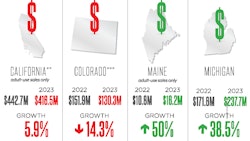
Colorado Gov. Jared Polis said rescheduling cannabis would be a move in the right direction in a Sept. 5 letter to President Joe Biden. He also called on the White House to put its nose to the grindstone on other incremental reform efforts.
Polis’ letter, which encouraged the Biden administration to move swiftly to reschedule cannabis at the federal level, comes a week after the U.S. Health and Human Services (HHS) recommended in an Aug. 29 letter to the Drug Enforcement Administration (DEA) that cannabis should be reclassified as a Schedule III drug under the Controlled Substances Act (CSA). Cannabis is currently classified as a Schedule I drug along with “high abuse” substances like heroin, LSD, methaqualone and ecstasy.
RELATED: US Health and Human Services Department Recommends Cannabis Reclassified to Schedule III
In addition to rescheduling cannabis, Polis also urged the Biden administration to work toward supporting cannabis industry access to safe banking, reduced criminal penalties for possession and distribution of cannabis, and addressing immigration related consequences and enforcement discretion from the U.S. Food and Drug Administration (FDA).
Up front, Polis thanked Biden for taking the lead in October 2022, when he directed HHS Secretary Xavier Beccera and Attorney General Merrick Garland to initiate an administrative process to review how cannabis is scheduled under federal law.
“It’s about time,” Polis wrote. “This is an historic moment, and we owe you and your administration a debt of gratitude for your leadership on catching up with where the science is. Cannabis’ current classification under federal law as a Schedule I drug is contradicted by the scientific evidence. The notion, as previously considered, that cannabis has no accepted medical use, a high potential for abuse, and no accepted safety standards even under medical supervision has been widely disproven, HHS’s recommendation is evidence-based and a move in the right direction.”
Specifically, the FDA considered eight factors to determine the proposal for cannabis to be controlled or removed for the schedules before the HHS made its non-binding recommendation to the DEA.
While Polis said the HHS recommendation was “most welcome news,” and that he was writing to offer support for the DEA to promptly review and act upon the FDA’s analysis in the coming weeks, he asked Biden to support other steps toward federal reform.
Polis specifically pointed to Colorado—the nation’s oldest adult-use cannabis market—noting that state-regulated markets are working and have been successful, whether that be steering Americans away from “addictive and deadly opioids,” creating hundreds of thousands of jobs, or generating tens of billions of dollars in tax revenues for essential government functions, the governor said.
“But the state-regulated industry is facing headwinds nationwide,” Polis wrote. “As a result of antiquated, punitive tax policies attributable to Section 280E of the Internal Revenue Code, state-regulated cannabis companies are paying up to an effective 80% federal tax rate. This has proven unsustainable for those abiding by state laws. State-legal cannabis companies also can’t readily access traditional banking services, requiring that transactions be made in cash, thus creating a danger to public safety.”
Because of these federal roadblocks, Polis said, the illicit cannabis market continues to thrive throughout much of the U.S., allowing public health and safety issues to persist despite the solution of well-regulated marketplaces.
Polis also said it’s past time to address the criminal penalties associated with cannabis as disparities among Americans, notably arrest rates for African Americans, remain prevalent during the ongoing drug war.
“We must do better,” Polis wrote. “While rescheduling will not solve those problems, it will eliminate the prospect of criminal penalties for tax evasion, as removing cannabis from Schedule I and placing it in Schedule III would not allow for tax evasion prosecution in this context. I stand ready to work with your administration on reforming criminal penalties for cannabis once scheduling reform is behind us. A signal from you indicating support for criminal justice would go a long way toward brining young people to the polls in 2024.”
Polis also highlighted what he called “significant progress” in the medical and scientific understanding of cannabis and advancements during the past decade. These advancements come as 38 states have legalized medical cannabis programs in the U.S. without strict restrictions, like in Texas, where THC is capped at 1%, or in Georgia, where patients are limited to low-THC cannabis oil.
The are currently 5.5 million medical cannabis patients in the U.S., Polis said, citing a May 2021 report by industry advocacy group Marijuana Policy Project.
The governor also called on the FDA to develop enforcement guidance to minimize “economic disruption” and encourage state-federal collaboration.
“To provide clarity, we hope that you will press FDA to develop and publish guidance outlining their enforcement discretion and priorities with respect to the state-regulated cannabis industry,” Polis wrote. “Specifically, an enforcement discretion policy should articulate that FDA will not bring a compliance action against companies whose products and activities are authorized by state medical and recreation marijuana laws, so long as they are abiding by state law and not making health claims, marketing in interstate commerce, or marketing to children.”
Polis encouraged Biden to work with him to “finish the job.”


























